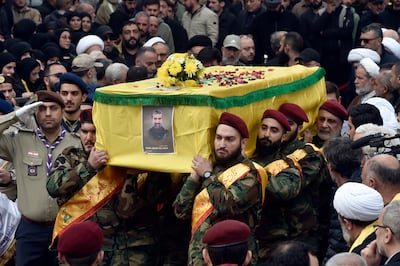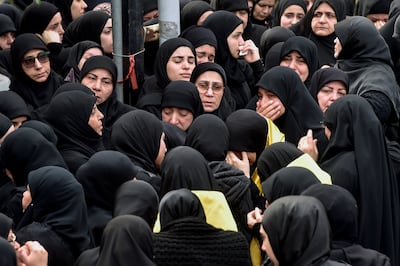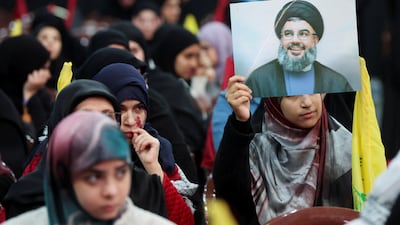In recent remarks to his party’s OTV television channel, Lebanon’s former president Michel Aoun was critical of Hezbollah’s decision to intervene on Hamas’s side in the Gaza conflict. The implications of his remarks complicated a problem Hezbollah has had with its so-called “unity of the arenas” strategy. This strategy holds that Israel’s main foes who are non-state actors – Hezbollah, Hamas, the Islamic Jihad, Yemen’s Houthis and pro-Iranian militias in Iraq – would co-ordinate their operations against Israel when required.
Mr Aoun declared: “We are not linked to Gaza through a defence treaty. It’s the Arab League that can unify the fronts, but a part of the Lebanese population has made a choice [not to enter the war] … Victory is that of a country, not just of one party … Saying that participation in the [Gaza] war is to pre-empt an Israeli attack is merely an opinion. Entering into a confrontation may not reduce the dangers, but increase it. Translating developments in Gaza and southern Lebanon into a presidential deal is not permitted when it comes to [Lebanon’s] sovereignty.”
Mr Aoun’s latter point perhaps best expressed what bothered him. The former president appears to believe that Hezbollah may try to use the conflict with Israel as a lever to bring in its preferred candidate, Suleiman Frangieh, as president. This would come at the expense of Gebran Bassil, Mr Aoun’s son-in-law and favourite to succeed him.
But beyond political sour grapes, Mr Aoun was making a larger point. Hezbollah has effectively hijacked the state’s prerogative to declare war, and it has taken Lebanon into a risky conflict with Israel that could, if things go wrong, lead to the country’s destruction. Moreover, Mr Aoun made his remarks at a time when many parties are hesitating to criticise Hezbollah in the midst of the battle in southern Lebanon.

The former president’s detractors will have remarked that he failed to issue similar reproaches in 2006, when Hezbollah also had unilaterally carried Lebanon into a war with Israel. The reason is that he had just concluded a political alliance with the party at the time, one he hoped would win him the presidency. Nor did Mr Aoun condemn Hezbollah after he became president, as he needed its support during his term in office.
However, this should not take away from the import of his words, and Hezbollah will have to think about their repercussions. Most Lebanese, including many within the Shiite community, don’t want a war with Israel. Lebanon suffered greatly from the Palestinian armed presence in the past, and while many Lebanese sympathise with the people of Gaza, they do not want to see their country again pay a price for such solidarity.

At the same time, the progress of the conflict between Hezbollah and Israel has raised questions about the “unity of the arenas” approach by Iran’s allies. After the October 7 Hamas attack, Hezbollah’s leader, Hassan Nasrallah, was at pains to explain why his party had not used its heavy weapons against Israel to reduce pressure on Hamas. Rather, Hezbollah opened up a limited front along the border, using smaller-calibre weapons.
While a major escalation was never explicitly an aspect of the “unity of the arenas” strategy – and the strategy’s strong point was ambiguity in how it would be applied – Hamas evidently expected more from Hezbollah. Last October, Khaled Meshaal, the former head of Hamas, stated that “when such a heinous crime is perpetrated against Gaza, greater things are certainly needed”, by which he implied from Hezbollah.
Mr Nasrallah, in his first speech after the Hamas attack, was forced, uncomfortably, to clarify Hezbollah’s position. He said that Hezbollah would support Hamas, but the Lebanese front was a “support front” for Gaza. He also said that one of the factors determining his party’s response was the reality in Lebanon, implying that its economic collapse had made it incapable of withstanding major hostilities with Israel.
What made Mr Nasrallah’s remarks awkward was that, in times of war, enemies don’t like to clarify their positions as it may reveal weaknesses. And indeed, since Hezbollah underlined that it sought to avert a generalised war, the Israelis have taken advantage of this to kill party commanders and, even, assassinate a senior Hamas leader, Saleh Al Arouri, in the heart of Hezbollah’s stronghold of Beirut’s southern suburbs.
In light of this, and following Mr Aoun’s statements, Hezbollah finds itself in an uncertain situation. The former president suggested that the party did not enjoy a consensus around its regional alliances and actions, while its efforts to contain the violence with Israel have shown that the “unity of the arenas” strategy has very clear limits because of Lebanon’s vulnerabilities. Neither reality can be reassuring for Hezbollah down the road.
That’s not to say that Hezbollah will emerge weakened from the conflict in the south. It may manage to work regional and international endorsement of Mr Frangieh into any post-war deal. However, it is Iran, more than Hezbollah, that has come out of the Gaza crisis looking stronger, because of its allies’ ability to open several fronts simultaneously. In turn, Hezbollah, for all its strengths, is navigating through a minefield of uncertainty.


